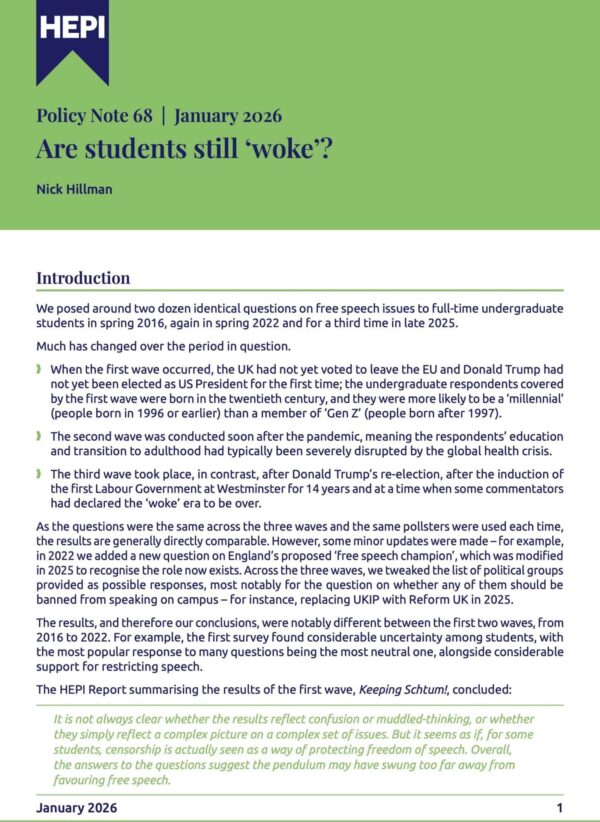Blueprint for a #HomeAtUniversity
Join HEPI for a webinar on Thursday 11 December 2025 from 10am to 11am to discuss how universities can strengthen the student voice in governance to mark the launch of our upcoming report, Rethinking the Student Voice. Sign up now to hear our speakers explore the key questions.
This blog was kindly authored by Dr John Cater, Chair of The Unite Foundation, and former Vice Chancellor of Edge Hill University.
It is the first blog in HEPI’s series with The Unite Foundation on how to best support care experienced and estranged students.
Today, the Unite Foundation launches its Blueprint for a #HomeAtUniversity, a guide to support universities in building a safe and stable home for care experienced and estranged students. Why?
Unite Students, our principal sponsor, operates with a clear awareness of commercial considerations and the expectations of its shareholders. Yet, from its earliest days, it has also been a business with a strong moral purpose: to provide homes for (mostly) young people in higher education as they transition from late teens into independent adulthood. Reflecting this commitment, more than a dozen years ago, Unite Students chose to fund a separate, free-standing charity – the Unite Foundation – to support care experienced and estranged students at university. A key part of this support has been the provision of free accommodation for a full three-year period, including vacations, for what is now almost 900 students.
But it is more than this. As our work develops, the Unite Foundation is committed to helping care experienced and estranged students build their own mutual support networks. To support this, we have been lobbying and working with policy-makers and higher education staff members to ensure that all of those who leave care at the age of eighteen do so with a rent guarantor, better enabling the transition into independent living and the labour market.
Progress is being made, but there remains much to do.
At present, there are some 17,000 care experienced and / or estranged students recorded as in higher education, but this figure would be three times higher if the progression rate from Level Three matched that of the host population.
To be clear, this is primarily a matter of opportunity, not ability.
Not surprisingly, even amongst those successful in accessing higher education, we see from OfS data that care experienced and estranged students also have lower continuation and completion rates, with withdrawals in the first year of study nearly double those of the student population as a whole.
But this understandably weaker performance can be turned around; independent research by Jisc for the Unite Foundation has shown that care leaver and estranged students in accommodation guaranteed and funded for three years by the Unite Foundation and its partners broadly matches the total population both in retention and in performance – eliminating the 13.4 percentage point discrepancy in the award of ‘good’ (1st and upper 2nd class honours) degrees. And, whilst the Unite Foundation scholarship is currently the only intervention evidenced at Office for Students’ Tier 2 level, the tide is flowing with us. We are seeing increased recognition of the importance that accommodation plays, both in addressing the basic needs of care experienced students as well as enabling greater progression and completion in higher education. This includes:
- The Social Market Foundation Report on care and learning in higher education seminal commentary into care leavers in HE.
- The decision of members of the Russell Group to provide more consistent support for care leavers.
- The recent report from the Children’s Commissioner providing a vision for care in the future.
These all recognise the importance of accommodation in providing for a secure and stable experience.
We now have a duty to act to make this a reality.
The Blueprint
So what is our newly published Blueprint recommending?
- Guaranteed safe and stable accommodation, year-round
- A personal housing plan for each care experienced or estranged student
- A record that regularly updates how care experienced and estranged students are progressing
- The removal of the rent guarantor barrier
- Optional early check-in and enhanced support on arrival and induction
- Accommodation scholarships
We know that every university context is different and that each university will develop a safe and stable #HomeAtUniversity in a different way. As a result, for each of our recommended actions, we are building a bank of case studies, ‘how-to’ guides and other useful links to help institutions navigate their journey. Visit www.unitefoundation.org.uk/blueprint to find out more.
In supporting universities to build a #HomeAtUniversity, and commending the moral imperative that underpins this, we are also commending better recruitment – until we match sector norms, there are some 40,000 care leavers aged 18-21 that are not currently in higher education – better retention, better continuation, better degree results, better labour market outcomes. And for the University, retained tuition fee income, improved performance measures, including in your Access and Participation Plan, a contribution to your NECCL Quality Mark and Care Leaver Covenant Pledge and, most of all, the sense of providing the opportunity for those who have had fewer chances to fulfil their potential.
Where now?
We know that accommodation is a cross-institution issue, and, in the coming months, we will create Blueprint resources to support different stakeholders across universities, from finance directors, to student union reps, to widening access officers. From my experience as a long-standing Vice-Chancellor I know that this kind of roadmap, this Blueprint, is motivating in supporting complex institutions to move forward, changing lives and life chances. If you want to know more, do reach out to Kate Brown, Co-Director of the Unite Foundation.







Comments
Add comment